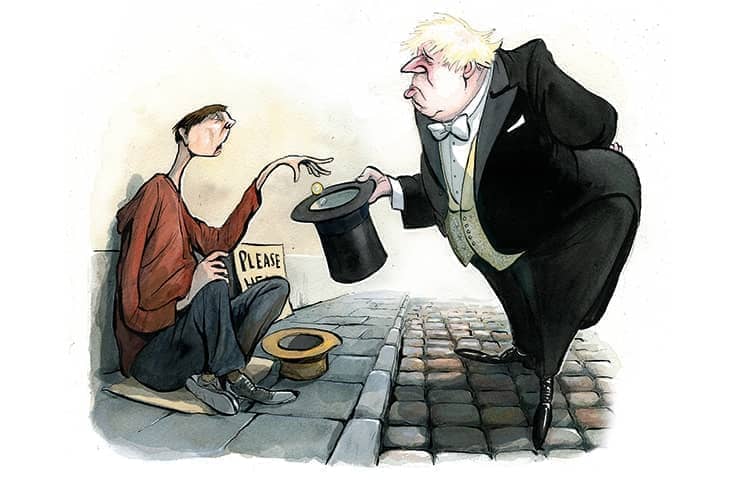The current Tory breakdown is all the more remarkable given how quickly it has happened. As recently as last September they led comfortably in the polls. Keir Starmer was widely derided as an ineffectual centrist bumbler with no charisma. At the start of this parliament, in early 2020, the Tories looked invincible, holding an 80-seat majority having won 43.6 per cent of voters.
And now, at the peak moment of crisis, there is serious talk of bringing back Boris. Well-informed commentators seem to think he could still garner the support of more than 100 MPs, and perhaps even be back in Downing Street in time for Guy Fawkes Night. The Emperor slips away from Elba and marches north to Paris, attracting the old veterans of his great campaigns. One more shot at glory.
Whether or not Johnson can indeed be reunited with his Lulu Lytle wallpaper, it seems extraordinary that any Tories should even be considering such a step. Absence may make the heart grow fonder, but the fundamental fact remains that in most important respects the Johnson ministry was a failure.
After the compromises and frustrations of the coalition, and then the chaotic and Brexit-dominated May era, many of conservatives had high hopes at the start of 2020. Here we had a popular government with a clear mandate, ready to put the Brexit squabbles behind and get on with the job. Get housing built by reforming the planning system, invest in infrastructure, grow the economy, reduce immigration. There was a golden opportunity to begin disarming the Blob, by repealing or reforming legislation like the Malicious Communications Act – which gives the police power to arrest you for tweeting incorrect thoughts – or the Equality Act, which is the ultimate cause of most of the ‘wokery gone mad’ stories that Tory MPs love to rant about.
And yet almost nothing has been done on any of these fronts. House prices have surged over the last three years; infrastructure, especially energy, was neglected. Police forces remain obsessed with political self-flagellation and seemingly regard actual crimefighting as an inconvenient distraction from their core role as the provisional wing of Pink News. Public bodies and private companies still have to devote huge amounts of time and money to satisfying the equality and diversity bureaucracy. Immigration has grown enormously, while the Channel crisis continues unabated – just last week more than 2,000 illegal immigrants came ashore.
Boris loyalists will point to Covid as the fly in the ointment. The pandemic knocked everything off course, they argue, by taking up so much political bandwidth that it was impossible to get other things done. The overdone pseudo-scandal of partygate, whipped up by a dishonest media, prevented the real Johnson agenda from being carried out.
There is some truth to this. It is easy to forget now how serious things were for much of 2020 and in the early part of 2021. But equally, as a matter of desperate and urgent political concern, Covid was over by the late spring of 2021, some 18 months ago. And even during the Covid year, there is no reason at all why non-health ministers working from home could not have been working on legislative proposals to address some of the pressing matters noted above. Some of the steps needed – like removing section 127 of the Malicious Communications Act, or requiring the College of Policing to stop recording ‘non-crime hate incidents’ – are extremely simple. In the same way, the highly important task of replacing the Blairite guerrillas who still dominate the quangocracy is not difficult from an administrative perspective, but requires a certain amount of political and social nerve.
When it comes down to it, the essential requirements for getting things in done in politics are a thorough understanding of the levers available, and courage. To put it another way, you need to know the real causes of the problems you face, and the tools available to fix them, and you need to be willing to carry through the fix in the face of harsh and personal hostility.
There is very little evidence that the Johnson government had either of these requirements. We saw a good deal of government as punditry, with MPs and ministers delivering furious denunciations in the media of people smugglers, or authoritarian policing, or attacks on free speech, or the violence of BLM protests. But there was very little understanding of why problems persisted and what an elected government with a large majority could do to stop them.
Boris didn’t fail because of Covid or because of the media. He failed because neither he nor his government had sufficient grip, clarity and ruthlessness to achieve conservative goals. That hard truth must be faced before the Tories can recover.






Comments